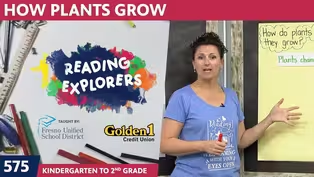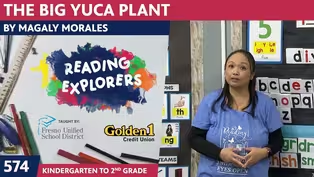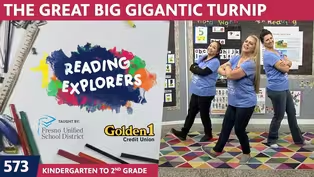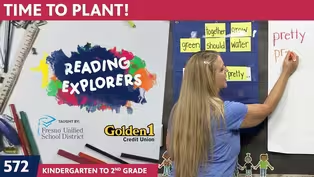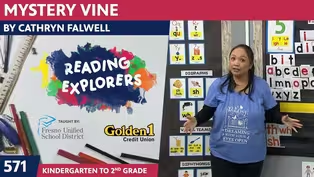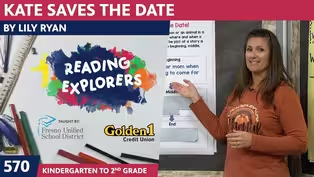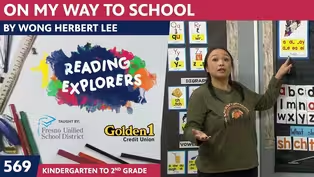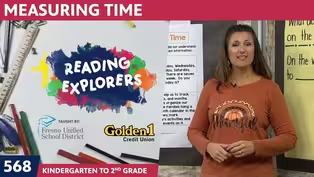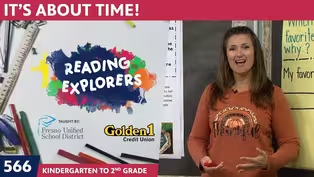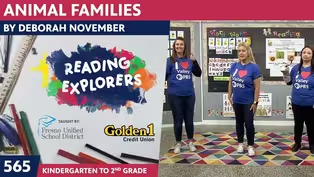
3-364: Steps to Edit the Rough Draft of a Book Review
Season 3 Episode 359 | 14m 14sVideo has Closed Captions
Join Mrs. Nix at Camp Discovery!
Third Grade teacher, Mrs. Nix, welcomes students back to Camp Discovery, a fun learning space packed with reading adventures & fun games!
Problems playing video? | Closed Captioning Feedback
Problems playing video? | Closed Captioning Feedback
Reading Explorers is a local public television program presented by Valley PBS

3-364: Steps to Edit the Rough Draft of a Book Review
Season 3 Episode 359 | 14m 14sVideo has Closed Captions
Third Grade teacher, Mrs. Nix, welcomes students back to Camp Discovery, a fun learning space packed with reading adventures & fun games!
Problems playing video? | Closed Captioning Feedback
How to Watch Reading Explorers
Reading Explorers is available to stream on pbs.org and the free PBS App, available on iPhone, Apple TV, Android TV, Android smartphones, Amazon Fire TV, Amazon Fire Tablet, Roku, Samsung Smart TV, and Vizio.
Providing Support for PBS.org
Learn Moreabout PBS online sponsorshipMore from This Collection
Valley PBS and Fresno Unified School District have partnered with Golden 1 Credit Union to create Reading Explorers Lessons for grades Pre-Kindergarten through Third grade. The daily lessons will be taught by Fresno Unified School District teachers and are created to help students practice their reading skills and reinforce lessons during distance learning.
Video has Closed Captions
Learn about the life cycle of a plant on Reading Explorers. (26m 39s)
K-2-574: The Big Yuca Plant by Magaly Morales
Video has Closed Captions
Join the Reading Explorers as we adventure into a new book The Big Yuca Plant. (26m 30s)
K-2-573: The Great Big Gigantic Turnip
Video has Closed Captions
What will happen at The Great Big Gigantic Turnip? (26m 30s)
K-2-571: Mystery Vine by Cathryn Falwell
Video has Closed Captions
The Bell has rung and the Valley PBS Classroom is open once more. (26m 32s)
K-2-570: Kate Saves The Date by Lily Ryan
Video has Closed Captions
Mrs. Nix, Mrs. Hammack and Mrs. Vang are glad to have you join her for a new day. (26m 32s)
K-2-569: On My Way To School by Wong Herbert Lee
Video has Closed Captions
Mrs. Vang is ready for a new day of phonemic awareness and reading comprehension. (26m 40s)
Video has Closed Captions
We review phonics, frequency words and more on Reading Explorers. (26m 45s)
K-2-567: Nate The Snake Is Late
Video has Closed Captions
What happens when Nate the Snake is late to school? (26m 49s)
Video has Closed Captions
It's time for school! How do you know what time it is? (26m 31s)
K-2-565: Animal Families by Deborah November
Video has Closed Captions
Welcome to the Reading Explorers lessons in the Valley PBS Classroom. (26m 14s)
K-2-564: From Caterpillar To Butterfly
Video has Closed Captions
The transformation from Caterpillar to Butterfly is a special one. (26m 52s)
Providing Support for PBS.org
Learn Moreabout PBS online sponsorship- ♪ Good morning to a brand new day.
♪ ♪ Time to learn and games to play.
♪ ♪ Learning things is so much fun.
♪ ♪ Learning is good for everyone.
♪ (upbeat music) - Good morning 3rd Graders.
My name is Mrs. Nixon.
I am so excited to be here with you and support you as you become amazing thinkers, readers, and writers.
Now, I'm sure that you've been with me all week and you're going, "Oh, Mrs. Nix!
It's another day to spend learning about writing".
Usually we're talking about reading and how to read words and comprehend things.
And this week we're talking all about writing and that writing process.
What are we writing about this week?
Do you remember?
That's right.
A book review.
So here's a quick reminder.
If you need a book, you can check out a book through your local county library, your school library or go online to the app Sora and check it out for free.
Especially here in Fresno Unified.
All right.
Are you ready to start our day?
Excellent.
Let's start out, we're going to warm up our brains looking at some high frequency words, we're going to practice a little grammar and then we're going to get into that writing process.
Oh my goodness, look at all of these high frequency words that we have here.
There's a ton of them, but you know what?
Don't fret, because remember these are all the words that we've been practicing the last five weeks.
This is how much work you've been doing.
I'm so proud of you!
Great job!
We're going to go through, we're going to read these top 10 of them together and if you notice something here and you think to yourself, "Ooh, you know what?
It's been awhile.
I could maybe use a little brushing up on it".
That's okay.
It's totally okay.
Write it down.
Practice.
Use it in a sentence and you'll get it.
All right.
You ready to start?
Okay.
I'm going to read them here in the studio and you read them at home big and loud.
Let's do it together.
Here we go.
"Big, because, black, been, before, blue, best, both, bring, and better".
Nicely done 3rd Grade.
Fantastic work.
Okay.
Let's dig into some of our grammar today.
Now we've been talking about pronouns and a pronoun is simply a word that can take the place of a noun.
We use them to make our sentences more interesting as we're writing.
Cause we don't always want to say, "My dog likes to play fetch.
My dog runs in the morning.
My dog jumps off the couch".
If we keep saying, "my dog", it's going to sound so boring.
So we use pronouns to help us with our sentences and make them more interesting.
Now, there are some rules with pronouns and some things that we need to be aware of as writers and so we're going to practice some of that today.
So here we go.
Today, we're going to talk about that "some possessive pronouns can stand alone.
Possessive pronouns that can stand alone include mine, your, his, hers, its, ours and theirs.
Here's an example.
"This jacket is his."
We didn't have to say anything more.
We could just end the sentence.
"Is this locker yours?"
It stands alone.
Okay.
Let's talk about it with some examples.
Some non-examples and some examples here.
So, we're gonna read these sentences and the possessive pronouns in the parentheses and then we're going to choose the correct possessive pronoun.
All right.
So we have "our" and "ours".
Okay.
"The students in..." Would we say, "ours class"?
No, we would say, "our class".
So, "the students in our class are painting pictures of sea life".
Okay.
So this "our" does not stand alone.
"Ours" does.
Let's watch.
Okay.
"I am almost finished with..." If I were to use "my", "my" doesn't stand alone.
I would have to tell you what it is that I'm finished with.
I am almost finished with my painting.
Okay.
We can't do that.
We need a pronoun that stands alone.
"Mine" stands alone.
So, "I am almost finished with mine".
It makes sense.
Okay, here we go.
"Have you finished your..."?
Oh, that doesn't stand alone.
We have to "yours".
"Yours" stands alone.
"Your", we need to finish the sentence, right?
"Have you finished your dinner?"
Okay.
"Staci showed me her painting".
Okay.
Now it finished out our sentence, so we just have "her" and "Calvin showed me his too".
Good job.
All right.
So, just bringing a little bit of awareness about our pronouns and as we're using them because we're going to use them in our writing.
Now, this week, we've been practicing that book review.
Okay.
So we've talked about that writing process.
We've gone through, we've talked about planning for it, writing a rough draft.
Yesterday we talked about revising and today we're going to talk about editing.
But, let's just do a quick review of what a book review is.
A book review states the author's opinion about the book, provides a short summary about the book.
Don't tell all the details.
Don't give away the ending.
It gives clear reasons that support the writer's opinion and it ends with a recommendation to readers.
Do you want them to read the story or not read the story?
Okay.
So, this next piece when I say that we're in that writing process, and I'm going to grab my chart over here, in the writing process, we're on to the editing piece.
And so editing really has to do with correcting our spelling mistakes and errors and things like that.
Some grammar.
Okay.
So when we are doing that, it's really helpful I'm going to move that out of the way for just a second.
It's really helpful to have an editing check list.
Now I know that this is down here.
It's a little bit small to look at but let's talk about some of the things that are on here.
"Do all of the sentences have proper punctuation?".
"Are all book titles, italicized or underlined?"
and we're going to talk about that today.
"Are the verb tenses, all correct?"
"Is there proper subject-verb agreement?"
And, "Are there any spelling errors?"
So today, we're actually going to look at this example writing the book review and we're going to look for some of these errors and we're going to correct them.
I'm going to show you how to do that today using our checklist and, then mark it up.
And then we're going to talk about some things that you can think about as you go through and you start to edit your own writing.
Okay.
So the first thing that we're really want to look look for, are some of those spelling errors.
Now to do that, we have to go back and we have to reread our writing again 'cause we're looking for those errors.
Okay, so, let's read it together and see if we can find some of those errors.
Okay.
"Antarctica: Life in the Cold".
"I just finished reading Antarctica: Life in the Cold".
Ooh.
I want to stop right there.
That reminds me.
Remember how we talked about on our editing checklist.
It says, "are all book titles italicized or underlined?".
I know that I am going to type this, so I want to remind myself, and so I kind of made it look fancy.
Do you see where I made it look fancy right there?
It's kind of written in italicize?
That's to remind me when I type it, that I I make it look, like in italics.
Okay.
So I just wanted to put that there.
I remember I marked that spot.
Okay.
"I just finished reading Antarctica: Life in the Cold a book about wildlife in the Arctic.
I usually..." Uh oh.
Usually is spelled wrong.
So I can quickly just go through and let's fix it.
Right?
Right here on the paper.
I'm not doing anything fancy.
You can put little Post-It notes over it, just like I did or you can just write on the paper.
However you want to do it.
"I usually enjoy learning new things but I did not like reading this book.
While its writer discussed many interesting animals, he did not go into much detail about many of them.
In some places, the writing is very repetitive and boring".
So, let's keep going.
"The writer talks about penguins.
He tells how penguins keep warm by huddling together and because of the soft feathers on their skin.
Then the writer mentions that penguins survive the cold by catching fish.
He does not provide enough information about the penguins.
For example, he does not tell how the penguins can swim how they can catch fish or about dangers that they face.
I knew more about penguins from writing a research report last year!
Next, the writer talks about seals.
In this section, the writer provide a good amount of details".
Uh oh.
"The writer..." What do we need to have here?
I put a little dot here so I'd remember.
We need an "s".
"The writer provides a good amount of details about the lives of seals in the Arctic.
He goes into much greater detail than he did with the penguins, but the writing is repetitive and boring.
The writer begins several sentences in a row with the word 'the'" and you know what boys and girls?
I want to make sure that I underline that word because it's almost like saying that's the exact thing that he was seeing every single time.
All right.
"Finally, the writer talks about whales.
He tells about how they keep warm how they breathe and what they eat.
Instead of trying to make this section interesting, the writer really just wants to list facts.
I would not recommend 'Antarctica: Life in the Cold'" And you know what?
I'm going to do the same thing I did on the front and remind myself I need to make sure that, that's in italics "because the writing is weak and there is not a whole lot of information about wildlife in Antarctica.
Many other books are available".
Ooh, "available".
Hm.
How do we spell "available"?
Let's fix it.
"available about these animals and you could find more interesting information on the web."
So.
This time we went back, we used our editing checklist to go through and talk about some of those errors that we could find.
But I also want to have a few things for you to think about as you go and you start to edit your own book review draft.
Okay.
So remember, you're going to proofread it.
You're going to read every word again.
Okay?
You're correcting mistakes for spelling, punctuation, capitalization, and grammar.
Just mark it right on that draft.
You don't have to rewrite the whole thing.
Just mark it up.
Now here's a little thing about spell checkers.
This is just a good reminder.
Many of them are not going to find wrong words.
For example, like the word there, it's a homophone.
So you might have the wrong homophone.
You might have T H E R E when you meant to have T H E Y apostrophe R E. And your computer's not going to catch that.
So just be aware of that.
Next, you want to use that editing checklist and do a peer review; have somebody else look at it and practice it and then, once you get your information, or once you get your draft back from your peer or your family member, it's time for you to go through and fix the errors.
And tomorrow, we're going to talk about that last step.
So, today 3rd Grade, I just want to say, thanks for hanging out with me as you're getting ready for school and remember, you are responsible for your learning success.
So listen, ask questions and share your ideas because together we can do so much more.
I can't wait to hear about your book review that you've been working on.
In fact, if you share it with me, you can send it to the studio and I'd love to hear about it and I will send you a book in the mail.
All right.
You have a fantastic afternoon and I look forward to seeing you back here tomorrow.
Take care.
Bye-bye.
(upbeat guitar music) - ♪ Good morning to a brand new day.
♪ ♪ Time to learn and games to play.
♪ ♪ Learning things is so much fun.
♪ ♪ Learning is good for everyone.
♪
Support for PBS provided by:
Reading Explorers is a local public television program presented by Valley PBS
